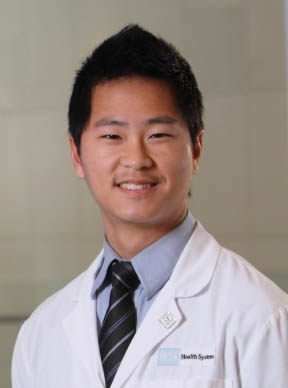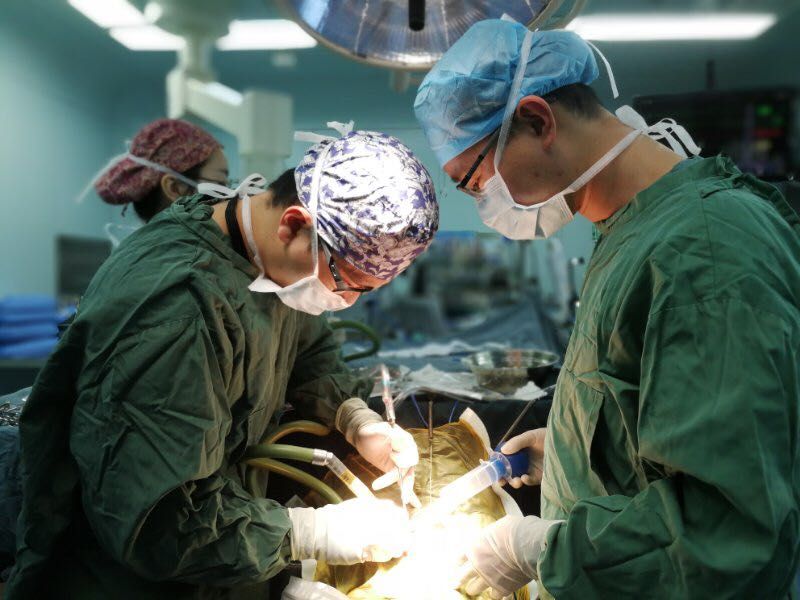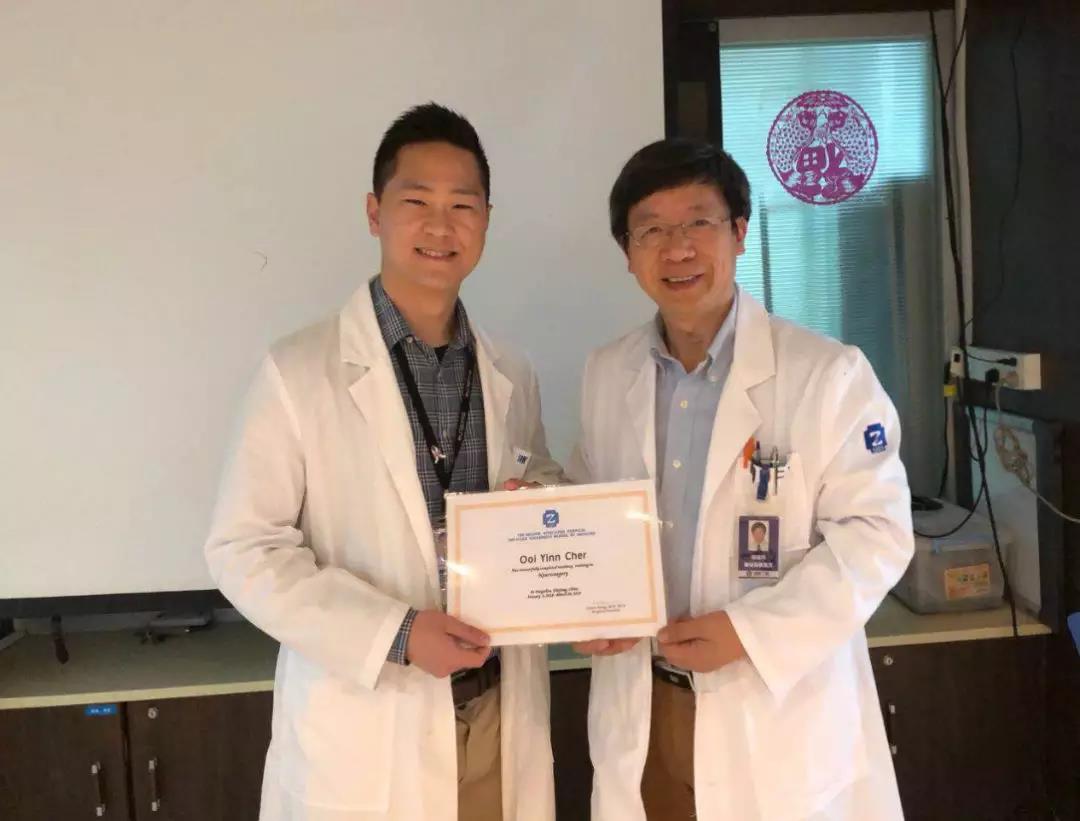
Dr. Yinn Cher Ooi is a Malaysia born Chinese American who is now in his last year of residency training at UCLA and has just recently finished his 3 month rotation at SAHZU Neurosurgery. He is the second UCLA neurosurgery resident coming to SAHZU for specialized training program. Here is Dr. Ooi’s reflection on his 3 months experience at SAHZU.

As the sun sets across the west lake on my last day at Hang Zhou. I reflect on the past 3 months I've spent at the SAHZU with the neurosurgery department. How can one put into words the rich cultural and in depth surgical experience I had the privilege of enjoying here. so forgive my feeble attempt with this summary.
My surgical experience:
Operating in a foreign country proposes many unique challenges in itself. For one, although I grew up speaking basic mandarin as a 3rd language, I was never acquainted with medical mandarin. But with the help of local residents I was able to gradually learn the name of simple instruments and disease. However, one cannot under estimate the challenges of having to pause and think of the name of the instruments one needs. It does bring about a disruption to the natural flow of surgery, a surgeon’s thought process during a case, and the absolute comfort of being in the surgical theater.
There is also a significant difference in the operating room culture. From mundane things like the differences in incision site preparation and putting on a sterile gown, to technical differences such as suturing techniques, reusing sutures, drill bits and other disposable items, to more complex things such as the use of arm rest while under the microscope, or the variety of microdissectors and aneurysm clips available. These differences bring about very eye opening perspectives and have certainly revealed to me some of the advantages but also flaws of the American surgical culture. From a training standpoint, the lack of a comprehensive selection of microdissectors that we are so often spoiled with in the USA has pushed me to further hone in on perfecting my own microdissection techniques, to rely more on the skills of a surgeon than the abundance of instruments to achieve the same goal during surgery. As a surgeon, I particularly appreciated the local practice of extubating patients in the recovery unit as opposed waiting for the patient to emerge from anesthesia and extubate within the operating room. This certainly allows a much quicker turn over time between cases and is perhaps something we can strive to mimic in the USA.
With respects to the focus of my rotation to supplement the vascular training that I've received so far at UCLA, the 2nd affiliate hospital is a key player on the vascular neurosurgery stage, with a comprehensive approach towards neurovascular diseases, seamlessly integrating open and endovascular approaches, making it the ideal institution to achieve such a goal. In the 3 months that I have spent at SAHZU, I was able to personally participate in up to 58 aneurysm surgeries. I have many of the SAHZU attendings to thank for the opportunity to perform these surgeries and in many cases even lead the surgery.

But even more important than actual volume was the kind of cases I was able to participate in. Of all the aneurysm cases I've done at SAHZU, only 5 were elective. This has really allowed me to be very comfortable handling ruptured aneurysms and handling dense subarachnoid hemorrhage during the dissections. But above all, it was the opportunity to partake and assist in the management of complex aneurysms that I found most educational for me. From the discussions during morning rounds debating ideas and various approaches to the operating room assisting and observing their best attendings tackle the most complex aneurysm. The time I've spent at SAHZU has no doubt tremendously contributed to my progress in vascular neurosurgery as a chief resident and has now become an integral part of my growth towards an independent neurosurgeon. My cultural experience: Being a Chinese born outside of mainland China, the past 3 months presented a unique opportunity for me to trace my roots and to be in touch with the rich cultural background my ancestors where once part of. There were several aspects of Chinese culture that I particularly enjoyed, one of which is the passion for tea. Being at Hang Zhou, the birth place of the famous "Long Jing" green tea, I was able to immerse myself fully into the regions passion for green tea. From strolling down tea street while witnessing the locals haggle with shop owners on the price of tea, to visiting the local tea plantations up in the mountains, soaking in the sweet aroma of the fresh tea leaves, and watching the local folk hand press the freshly picked tea leaves. Learning to savor a well brewed fresh green tea first by smelling the freshness of the tea then enjoying the sight of the leaves floating effortlessly within it and finally slowly savoring the flavor with every sip of tea. The local tea culture is certainly one that I find very unique to the region and an important part of daily Chinese life. Another highlight of my cultural experience in China was the simple act of enjoying a meal with the residents and attendings. The cultural significance of "Sharing a meal" with your guest or friends was evident throughout my stay in China. As a guest, I was constantly showered with gourmet food and local delicacies. On a weekly even daily basis I sampled the different local cuisines from local street food to the eye pleasing presentations of upscale restaurants all while enjoying the company of the various residents and attendings. But the cultural significance of sharing a meal goes beyond savoring the delicious food and satisfying the palate. It is a way to get to know your guest, to bond with someone at a personal level. Setting aside formalities and allowing a more colloquial and intimate environment. In my 3 months at Hangzhou, thanks to the warm hospitality of the many local residents and attendings who took time out of their day to make sure I was well taken cared of, I was afforded the opportunity to partake in various other local activities. From visiting tourist attractions, like the busy Hefang street, the gorgeous west lake, and the enormous LingYing temple, to the pleasures of daily Chinese life like enjoying a foot massage/wash and even a visit to the local spa. So with that said, I'd like to express my utmost gratitude to Prof Jianmin Zhang for allowing me to spend 3 months at the SAHZU neurosurgery department, and to the various vascular attendings whom I had the honor and pleasure of learning from. 3 months may seem like a long period of time to spend in a foreign land, but when you are having a great time making new friends and participating in a vast variety of complex vascular surgeries, the time passes in a blink of an eye. Hang Zhou and SAHZU, we will meet again in the future.

Yinn Cher Ooi, M.D.
Neurosurgery resident
University of California, Los Angeles
Author: | Reviewer: | Editor: | Source: | Date:2018-04-23 | Views:![]()